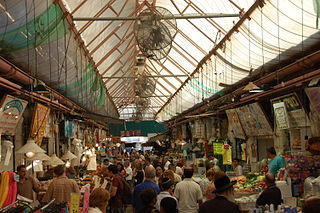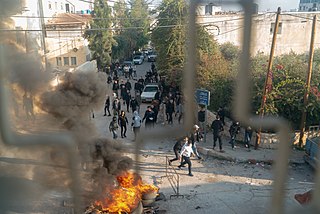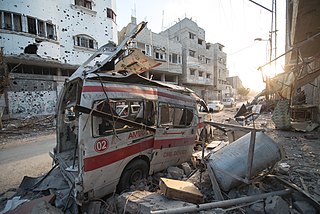Note: This compilation includes only those attacks that resulted in casualties. Attacks which did not kill or wound are not included.

The Second Intifada, also known as the Al-Aqsa Intifada, was a major uprising by Palestinians against the Israeli occupation, characterized by a period of heightened violence in the Palestinian territories and Israel between 2000 and 2005. The general triggers for the unrest are speculated to have been centered on the failure of the 2000 Camp David Summit, which was expected to reach a final agreement on the Israeli–Palestinian peace process in July 2000. An uptick in violent incidents started in September 2000, after Israeli politician Ariel Sharon made a provocative visit to the Al-Aqsa compound, which is situated atop the Temple Mount in East Jerusalem; the visit itself was peaceful, but, as anticipated, sparked protests and riots that Israeli police put down with rubber bullets, live ammunition, and tear gas. Within the first few days of the uprising, the IDF had fired one million rounds of ammunition.

Operation Defensive Shield was a 2002 Israeli military operation in the West Bank, carried out amidst the Second Intifada. Lasting for just over a month, it was the largest combat operation in the West Bank since the 1967 Arab–Israeli War, when Israel seized the territory from Jordan. Israel's stated goal for the escalation was to stop Palestinian terrorist attacks; the operation was launched two days after the Passover massacre, in which a Palestinian suicide bomber attacked the Park Hotel in Netanya, killing 30 civilians while injuring 140 more.

The Passover massacre was a suicide bombing carried out by Hamas at the Park Hotel in Netanya, Israel on 27 March 2002, during a Passover seder. 30 civilians were killed in the attack and 140 were injured. It was the deadliest attack against Israeli civilians during the Second Intifada.

Media coverage of the Israeli–Palestinian conflict by journalists in international news media has been said to be biased by both sides and independent observers. These perceptions of bias, possibly exacerbated by the hostile media effect, have generated more complaints of partisan reporting than any other news topic and have led to a proliferation of media watchdog groups.

The 1978 South Lebanon conflict began after Israel invaded southern Lebanon up to the Litani River in March 1978, in response to the Coastal Road massacre near Tel Aviv by Lebanon-based Palestinian militants. The conflict resulted in the deaths of 1,100–2,000 Lebanese and Palestinians, 20 Israelis, and the internal displacement of 100,000 to 250,000 people in Lebanon. The Israel Defense Forces gained a military victory against the Palestine Liberation Organization as the latter was forced to withdraw from southern Lebanon, preventing it from launching attacks on Israel from across its land border with Lebanon. In response to the outbreak of hostilities, the United Nations Security Council adopted Resolution 425 and Resolution 426 on 19 March 1978, which called on Israel to immediately withdraw its troops from Lebanon and established the United Nations Interim Force in Lebanon (UNIFIL).

Palestinian political violence refers to actions carried out by Palestinians with the intent to achieve political objectives that can involve the use of force, some of which are considered acts of terror, and often carried out in the context of the Israeli–Palestinian conflict. Common objectives of political violence by Palestinian nationalists include self-determination in and sovereignty over Palestine, or the "liberation of Palestine" and recognition of a Palestinian state, either in place of both Israel and the Palestinian territories, or solely in the Palestinian territories. Some perpetrators of these acts support the dismantling of the State of Israel and its replacement with a Palestinian Arab state. More limited goals include the release of Palestinian prisoners or the Palestinian right of return. Other motivations include personal grievances, trauma or revenge.
Pierre Rehov is the pseudonym of a French–Israeli documentary filmmaker, director and novelist, most known for his movies about the Arab–Israeli conflict and Israeli–Palestinian conflict, its treatment in the media, and about terrorism. Rehov is also a fiction writer, whose novels have enjoyed some success in France, and several have been translated into English and German.

Jenin, Jenin is a film directed by Mohammed Bakri, a prominent Palestinian actor and Israeli citizen, in order to portray what Bakri calls "the Palestinian truth" about the "Battle of Jenin", a clash between the Israeli army and Palestinians in April 2002.

Mohammad Bakri is a Palestinian actor and film director.
Operation "Determined Path" was a military operation carried out by the Israel Defense Forces, starting June 22, 2002, following Operation "Defensive Shield", with the goal of reaching some of the unreached objectives set forth for Defensive Shield, especially in the northern West Bank.
The following is a partial list of civilian casualties in the Second Intifada.

The Battle of Jenin, took place in the Jenin refugee camp in the West Bank on April 1–11, 2002. Israel Defense Forces (IDF) entered the camp, and other areas under the administration of the Palestinian Authority, during the Second Intifada, as part of Operation Defensive Shield. The Jenin camp was targeted after Israel reported that it had "served as a launch site for numerous terrorist attacks against both Israeli civilians and Israeli towns and villages in the area."

The Jenin refugee camp, also known as the Jenin camp, is a Palestinian refugee camp located in the city of Jenin in the northern West Bank. It was established in 1953 to house Palestinians who fled or were expelled from their homes by Israeli forces during and in the aftermath of the 1948 Palestine War. The camp has since become a stronghold of Palestinian militants, and has become known as "the martyr's capital" by Palestinians, and "the hornets' nest" by Israelis.
Events in the year 2002 in Israel.
Events in the year 2002 in the Palestinian territories.

A suicide bombing occurred on 12 April 2002 at a bus stop located at the entrance to the Mahane Yehuda Market, Jerusalem's main fruit and vegetable market. The site of the attack was chosen in order to cause maximum number of casualties. 6 civilians were killed in the attack and 104 were injured. The al-Aqsa Martyrs' Brigades claimed responsibility for the attack.
The following is a list of events during the Israeli–Palestinian conflict in 2022.

On 26 January 2023, the Israel Border Police and the Israeli army conducted an armed raid on the Jenin refugee camp, which is in Area A of the Israeli-occupied West Bank and under Palestinian civil authority. According to The Jerusalem Post, the objective was to prevent a planned terrorist strike and arrest three wanted Islamic Jihad militants.

Israeli war crimes are the violations of international criminal law, including war crimes and crimes against humanity, which the Israel Defense Forces, the military branch of the state of Israel, has been accused of committing since the founding of Israel in 1948. These have included murder, intentional targeting of civilians, killing prisoners of war and surrendered combatants, indiscriminate attacks, collective punishment, starvation, the use of human shields, sexual violence and rape, torture, pillage, forced transfer, breach of medical neutrality, targeting journalists, attacking civilian and protected objects, wanton destruction, incitement to genocide, and genocide.













